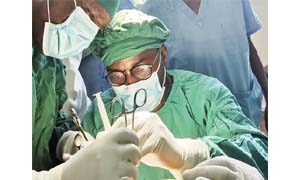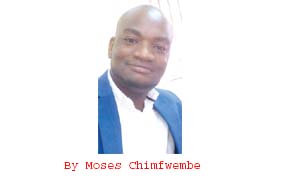“EVERY year, I repair an average of 10 fistula clients at either Solwezi General Hospital or during fistula camps at other hospitals. However, I know there are many other women suffering with fistula but are not able to access treatment due to lack of information or challenges in accessing health care.”
These are sentiments of Dr Paul Musoba, a fistula surgeon at Solwezi General Hospital in the North-Western Province of Zambia
Dr Musoba’s sentiments resonate with those of Ministry of Health Permanent Secretary for administration Christopher Simoonga during the launch of the Reproductive, Maternal, Neonatal, Child, Adolescent Health and Nutrition roadmap 2022 -2026 early this week.
“I am glad that this document is also speaking to obstetric fistula which we have not paid attention to and I hope that this time, we can gain some energy and ensure that we tackle issues of obstetric fistula head on,” Dr Simoonga said.
Other policy documents launched included the 2030 Commitments for Family Planning, and the Family Planning Costed Implementation Plan (2021 – 2026).
According to the World Health Organisation, obstetric fistula is a hole in the birth canal caused by obstructed labour.
It occurs when a mother has a prolonged, obstructed labour and does not have access to emergency medical care such as a caesarean section which leads to a further prolonged labour over many days and the death of a baby.
In Zambia, thousands of women and girls continue to experience maternal morbidities, with at least 33,400 of them having suffered from obstetric fistula by 2018 as estimated by the Zambia Demographic and Health Survey.
Fistula victims suffer constant incontinence, shame, social segregation and health problems.
Dr Musoba shared with UNFPA Zambia, his professional and personal insights into obstetric fistula and his work to surgically repair women and girls affected.
Here is an excerpt:

Question: What inspired you to become a fistula surgeon?
Answer: My inspiration is drawn from many aspects of the work I do. During the early stages of my practice as an obstetrician and gynaecologist, I encountered many women and girls who had suffered so much from obstetric fistula – one of the most serious injuries of childbirth and an underlying common risk of prolonged, obstructed labour without access to timely, high-quality medical treatment.
Observing women and girls being frequently abandoned and ostracised due to the constant leakage of urine, faeces, or sometimes both, was the starting point of my desire to change this narrative.
Question: How can you briefly describe a typical day as a fistula surgeon?
Answer: It is quite a fulfilling but, at the same time, challenging experience. As a fistula surgeon and an obstetrician and gynaecologist, my daily tasks are focused on the key components of safe motherhood – from pregnancy, childbirth and postnatal care.
Pregnancy and childbirth should be among the happiest moments in a woman’s life. Sadly, this is not the case for thousands of women and girls not only in North-Western Province where I am located but Zambia at large. At Solwezi General Hospital, I often encounter women and girls who have developed obstetric fistula, some of whom have lived with the condition for years.
My journey with a fistula client begins with my very first encounter with them, and getting to understand their current situation. The trauma suffered by many of my clients during delivery is very heartbreaking as it goes beyond the physical. It is emotional and socially damaging.
Throughout my journey with my clients, I focus not only on healing their physical wounds but also supporting their emotional and psychological healing as well.
As a surgeon, I immediately begin plotting my clients’ operative pathway, alongside its execution, sometimes with many difficulties.
During fistula camps, my surgical work would typically begin at 07;30 hrs in the morning and end at 18.00 hrs in the evening, taking 15-minute intervals in theatre between each client to maximise on time against the high demand.
This process, once concluded with a hospital discharge of a happy, “dry” and “content” client, makes me proud to be a fistula surgeon.
With inspiration and mentorship from some of Zambia’s well trained senior fistula surgeons, I first participated in fistula a camp in 2019. I was able to observe, assist and eventually undertake fistula surgeries.
It is definitely a specialised skill that requires constant practice and exposure. With support from UNFPA, I was trained to become a fistula surgeon. Today, I am one of the eight fistula surgeons in Zambia.
Question: What are some of the challenges faced while working to save the lives of women and girls affected by fistula?
Answer: Having access to expectant mothers before their time of delivery, as well as during the period they are suffering from fistula in their communities, is one of the biggest initial challenges faced.
Many women in North-Western Province live in remote areas located far from health facilities, often resulting in home deliveries – a key risk factor for obstetric fistula in the event of an obstructed labour.
For many fistula survivors, societal stigma still remains a major issue they face.
Successful reintegration is a key priority post-surgery. My recent encounter with an 18-year-old fistula survivor particularly stands out to me.
Resulting from an obstructed labour and delayed access to emergency health care, she developed obstetric fistula, alongside losing her baby. For two years, she lived with fistula and could not continue with her education. With the help of community health workers, she was able to access surgical care, and I successfully repaired her fistula.
Throughout this process, she was very jovial and optimistic, which definitely put a lot of pressure and confidence on the team. I personally made a follow up visit four months post her operation, and the optimistic 18-year-old girl we had discharged had an even brighter smile.
She told me, “Dr Musoba, thanks to you, I have now gone back to school and looking forward to completing my education”. It was quite an amazing story.
Dr Musoba’s account is a clear testimony that more needs to be done to create awareness on prevention and treatment of obstetric fistula.
With the forthcoming International Day to End Obstetric Fistula which falls on May 23 annually, it would be critical to have conversations around this condition and intensify actions towards its eradication.
Look out for another piece next week as we delve into Zambia’s 2030 commitments for family planning.
Keep your comments coming to moseschimfwembe@gmail.com







